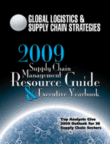
Visit Our Sponsors |
|
|
|
|
|
|
|
|
|
|
|
|
|
|
|
|
|
|
|
|
|
|
|
|
|
|
|
|
|
|
|
|
|
|
|
|
|
|
|
|
|
|
|
|
|
|
|
|
|
|
|

Compared to 2007, service-oriented architecture (SOA) and composite applications are seeing enhanced interest in the marketplace. The general market is becoming more aware of the underlying technology used by business process management and supply chain event management solutions. There are proof-of-concept implementations under way in the IT organizations of Fortune 500 companies with oversight by the supply chain line of business organizations.
BPM can help supply chain organizations integrate their disparate supply chain organizations and processes and enable transformation. Adoption of this technology will grow in 2009 as exemplified by the relatively higher percentage of interest among companies as compared to other focus areas. But the key question is: who should you partner with?
There are three types of BPM solution providers: stand-alone; ERP companies that package a BPM platform; and SCM best-of-breed companies that package a BPM solution.
Stand-alone BPM solution providers. The purpose of using stand-alone BPM platforms is to allow the IT organizations to build business processes from scratch without the software being packaged as part of a larger suite.
Evidence shows that companies have not made up their minds between any specific stand-alone BPM solution provider. Based on conversations with end users, in general they are hesitant to go toward specialist vendors for enabling deep supply chain domain applications unless they have the in-house talent to manage these custom business processes. There is an exception to the rule: BPM platform providers with a well-entrenched supply chain consulting practice.
ERP packages. The strategy that the ERP providers are adopting is that when companies upgrade their software they will automatically get an embedded BPM solution. Enterprises should look to upgrade to the versions of these ERP systems that support BPM and should focus their efforts on making minor tweaks and additions rather than large-scale enhancements. This will help companies to get educated on how to gain value through BPM. A note of caution with the ERP solutions is that all applications within the suite may not support extending business processes.
Best-of-breed packages. These are ideally positioned to leverage BPM because their functional and domain capabilities are considerably higher than the ERP packages. This provides the best-of-breed packages opportunities in marrying the opportunities provided by BPM with their strengths.
The Outlook
Given the increased globalization and growth in supply chain transformation initiatives, business processes are constantly in flux and there is a need to be able to manage these business processes more effectively.
Partners for BPM and the underlying SOA architecture need to be chosen carefully because these implementations could add additional complexity and risk increasing the total cost of ownership if done incorrectly.
• Choose specialized BPM providers only if there are adequate supply chain domain experts in the organization and also if there is a need for enabling composite applications on top of existing ERP / best-of-breed solutions.
• Choose ERP providers if there is an easy upgrade path available to the version that supports a BPM platform and if there are applications available in the platform that support extending business processes.
• Choose best-of-breed suite providers if you are a leading edge company that wants to create innovative workflows and business processes using a supply chain centric BPM platform.
The argument over whether BPM provides value or not will be converted into a discussion over how to go about customization and extension of processes.
RELATED CONTENT
RELATED VIDEOS
Timely, incisive articles delivered directly to your inbox.







